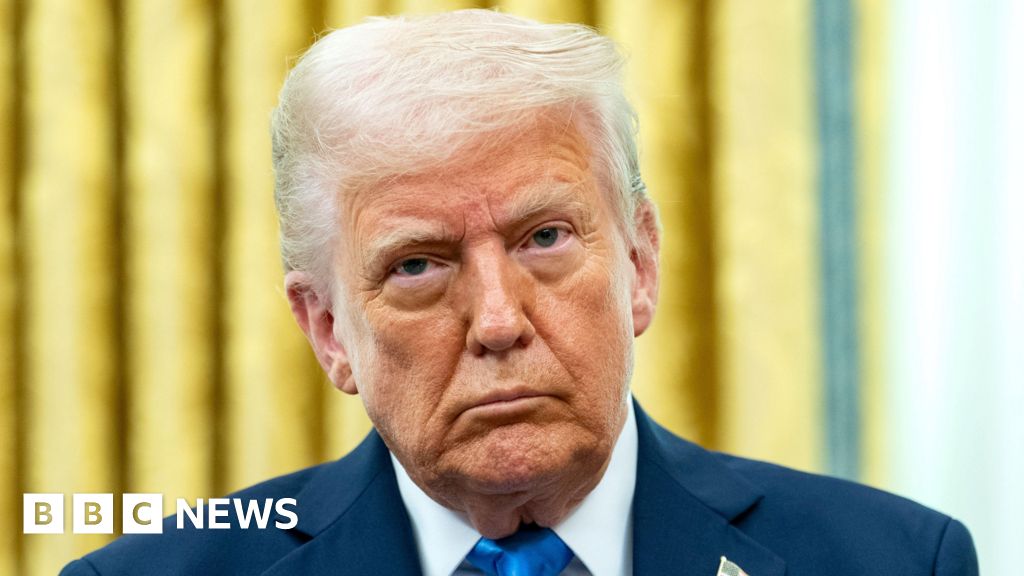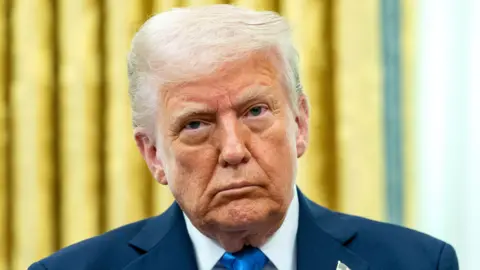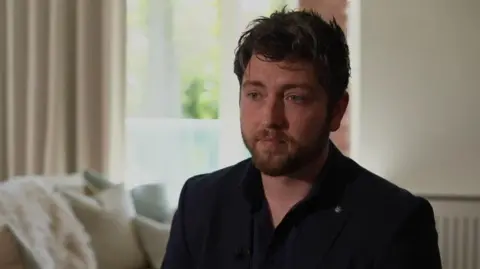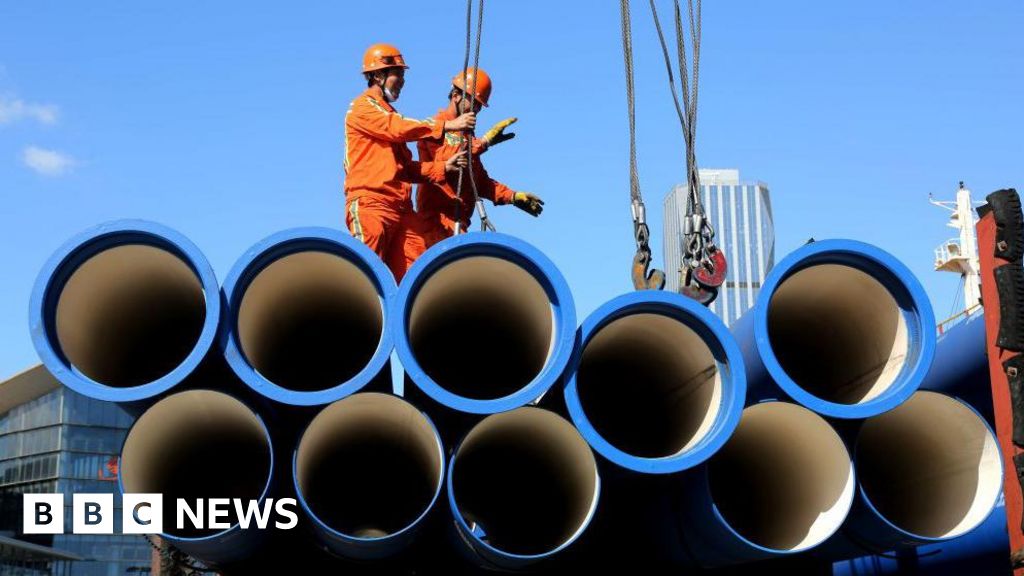Trump tariffs: ‘Could cost NI businesses at least £100m in lost sales’

BBC News NI economics and business editor
 Getty Images
Getty ImagesTariffs of 20% on Northern Ireland goods entering the US could cost local businesses at least £100m in lost sales, an economist has estimated.
US President Donald Trump is expected to announce a new round of tariffs later on Wednesday.
The UK government has been trying to negotiate an exemption but now expects that tariffs will be imposed on UK goods.
Northern Ireland sold goods worth about £1.3bn to the US in 2023, with a concentration in pharmaceuticals and industrial machinery.
Tariffs are effectively taxes applied to goods imported from other countries.
Governments impose tariffs in the hope of protecting local manufacturers from international competition.
Ulster University economist Esmond Birnie has calculated a “direct and narrow” impact of £100m in reduced sales from a 20% tariff.
He said second and third round effects, such as an overall reduction in global trade, could push the overall negative impact up to £200m – £300m.
He added that even a drop of £100m could still have a significant impact on overall economic performance.
“It is only about 0.2% of Northern Ireland’s overall GDP, which is about £50bn,” he said.
“However, if Northern Ireland’s growth in GDP this year is well under 1% – and this is quite likely – that would be equivalent to a quarter of economic growth.”
Stuart Anderson, from the NI Chamber of Commerce, said the US was a really important market and called on the UK government to “respond really, really clearly” after Wednesday’s announcement.
He added that could get “challenging” if the EU and UK respond differently.
Jim Nash is joint owner of the Wild Atlantic Distillery in Aghyaran, near Castlederg, in County Tyrone.
Their main target market for their whiskey is the United States and he fears tariffs could be “catastrophic” for small producers like them.
For the moment, until Trump announces the detail and extent of the tariffs, Mr Nash said it was a worrying time.
“There’s always trepidation because 50% of Irish whiskey sales go to the US,” he said.
According to the Irish Whiskey Association, exports of Irish drinks to the US are worth more than €800m a year.
Mr Nash said he was not confident that being based in the UK would protect them from tariffs.
“We go under the label of Irish whiskey, sell our products as Irish whiskey, so my concern – as legal advisers have said – is that there might be a little bit of leeway because we’re part of the UK, if tariffs are imposed.
“But how is that on the ground? You know, there’s 500 pallets of Irish whiskey coming through, is a customs official on the ground going to make a distinction?
“The law is one thing but the implementation is another thing and it might be that it’s just a blanket ban and I wouldn’t be so confident that the UK will be able to escape these tariffs if they’re implemented as well.”
Analysis: Will exports collapse?
We shouldn’t expect that exports to the US from Northern Ireland will collapse, because very often when you’re a manufacturer competing on a global stage, you’re not doing that solely on price.
It’s not like there’s a load of American companies who can immediately substitute what you’re doing at a cheaper rate.
What you’re probably likely to see is the volume of goods that might be sold into the US will decline just because they get more expensive.
There is also a Windsor Framework element to this – not on the export side because Northern Ireland goods going into the US are just UK goods.
But goods coming into Northern Ireland have to meet EU rules, so you could have a situation where the UK doesn’t retaliate, doesn’t impose any tariffs on US goods, but the EU would retaliate.
In that circumstance, US goods entering Northern Ireland would have to pay the EU tariffs but US goods entering the rest of the UK would not have to pay the tariffs.
There is the possibility that Northern Ireland importers could get a rebate of the tariff if they can show that the goods are staying within Northern Ireland.
What about the Republic of Ireland?
‘People are going to die’

Gareth Sheridan, chief executive of pharmaceutical firm Nutribrand, said the global supply chain would be drastically affected if the tariffs go ahead.
“On this island we make very important medications, chemotherapy treatments, heart medications, antibiotics, pain medications, diabetes medications,”he said.
“One in four Americans have actually foregone treatment because of the cost associated with that and now we’re talking about increasing medications by 25%, which insurance companies most likely won’t take on, so this is going to be an extreme burden on the patient.
“If you have a 25% hike on chemotherapy and you can’t afford your treatment anymore what’s the alternative? Ultimately, people are going to die and they’re going to die because they can’t afford to live.”
 PA Media
PA MediaSpeaking to the Good Morning Ulster programme on Wednesday, Neale Richmond, the Irish minister of state for foreign affairs and trade, said €50bn (£42bn) of pharmaceuticals are sold every year from the republic to the US.
“We will listen intently, but we have been preparing for this for quite some time and we’re poised to act with European colleagues regardless of what is said,” he said.
“We don’t expect to lose all our exports to the US regardless of tariffs. There are cancer patients and diabetics in the US who will still need these drugs regardless of the price.
“In a worst case scenario we think about 80,000 jobs won’t be created in the republic under a new tariff regime and that our economic growth will slow down from by 2.5-3% to closer to 1%.
“What that means is that the Irish economy won’t have the level of surplus that we have had the last number of years.”





